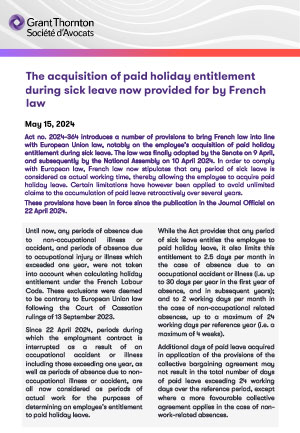-
Tax Policy Management
Tax Policy Management
-
Growth Management
Growth Management
-
Tax audit and litigation
Tax audit and litigation

-
Definition of a strategic and secure transfer pricing structure
Definition of a strategic and secure transfer pricing structure
-
Assistance in the development of international activities and operational reorganisations – “Business restructuring”
Assistance in the development of international activities and operational reorganisations – “Business restructuring”
-
Defense of practices and assistance in the context of tax audits and their follow-up from a litigation viewpoint
Defense of practices and assistance in the context of tax audits and their follow-up from a litigation viewpoint
-
Annual declaration and documentation obligations
Annual declaration and documentation obligations

-
Domestic and international VAT applicable to your company's flow
Domestic and international VAT applicable to your company's flow
-
Banking and financial VAT, VAT in the insurance sector
Banking and financial VAT, VAT in the insurance sector
-
VAT related to real estate registration fees
VAT related to real estate registration fees
-
VAT in the public and non-profit / association sector
VAT in the public and non-profit / association sector
-
Tax audit, tax litigation and relations with the Tax authorities
Tax audit, tax litigation and relations with the Tax authorities
-
Applicable rules for invoicing
Applicable rules for invoicing
-
Customs issues related to your company's international flows
Customs issues related to your company's international flows
-
French VAT registration and compliance obligations
French VAT registration and compliance obligations
-
Payroll tax
Payroll tax
-
Other indirect taxation
Other indirect taxation

-
Company transfer diagnosis
Company transfer diagnosis

-
Distribution strategy : Implementing and structuring
Distribution strategy : Implementing and structuring
-
Distribution activities digitalisation
Distribution activities digitalisation
-
Relations between suppliers and distributors
Relations between suppliers and distributors
-
Contractual policy : etablishing and structuring
Contractual policy : etablishing and structuring
-
Controls and litigation regarding payment terms
Controls and litigation regarding payment terms
-
Organising and securing commercial relations with consumers
Organising and securing commercial relations with consumers
-
Data protection - GDPR
Data protection - GDPR
-
Commercial Leases
Support in the management and contract management of commercial leases.

-
Traditional Services offered
Traditional Services offered
-
Health at work and quality of life at work
Health at work and quality of life at work
-
HR Management Audit
HR Management Audit
-
HR Engineering and People Change
Implementing managerial solutions in line with the company's strategic challenges
-
Management of HR compliance and internal investigations (harassment, discrimination, and whistleblowing)
Management of HR compliance and internal investigations (harassment, discrimination, and whistleblowing)

-
Advice on legal structuring
Advice on legal structuring
-
Day to day company management
Day to day company management
-
Companies reorganisation
Companies reorganisation
-
Mergers & Acquisitions - Private Equity
Mergers & Acquisitions - Private Equity
-
Changes in shareholder structure - Securities issue
Changes in shareholder structure - Securities issue
-
Governance and legal risks management
Governance and legal risks management

-
Development of an international mobility policy
Development of an international mobility policy
-
Coordination of reporting obligations for employees in a mobility situation
Coordination of reporting obligations for employees in a mobility situation
-
Advice on social security
Advice on social security
-
Assistance in labour law
Assistance in labour law

-
Management and protection of your portfolio of property rights
We put the most appropriate protection policy in place for our clients’ intellectual property rights.
-
Securing your projects: advisory and drafting of agreement services
We advise you on the feasibility of your project and the securing of your intellectual property and IT rights.
-
Enforcement of your rights: pre-litigation and litigation
Enforcement of your rights: detection of infringement, pre-litigation and litigation

Act no. 2024-364 introduces a number of provisions to bring French law into line with European Union law, notably on the employee’s acquisition of paid holiday entitlement during sick leave. The law was finally adopted by the Senate on 9 April, and subsequently by the National Assembly on 10 April 2024. In order to comply with European law, French law now stipulates that any period of sick leave is considered as actual working time, thereby allowing the employee to acquire paid holiday leave. Certain limitations have however been applied to avoid unlimited claims to the accumulation of paid leave retroactively over several years.
These provisions have been in force since the publication in the Journal Officiel on 22 April 2024.
Until now, any periods of absence due to non-occupational illness or accident, and periods of absence due to occupational injury or illness which exceeded one year, were not taken into account when calculating holiday entitlement under the French Labour Code. These exclusions were deemed to be contrary to European Union law following the Court of Cassation rulings of 13 September 2023.
Since 22 April 2024, periods during which the employment contract is interrupted as a result of an occupational accident or illness including those exceeding one year, as well as periods of absence due to non-occupational illness or accident, are all now considered as periods of actual work for the purposes of determining an employee’s entitlement to paid holiday leave.
While the Act provides that any period of sick leave entitles the employee to paid holiday leave, it also limits this entitlement to 2.5 days per month in the case of absence due to an occupational accident or illness (i.e. up to 30 days per year in the first year of absence, and in subsequent years); and to 2 working days per month in the case of non-occupational related absences, up to a maximum of 24 working days per reference year (i.e. a maximum of 4 weeks).
Additional days of paid leave acquired in application of the provisions of the collective bargaining agreement may not result in the total number of days of paid leave exceeding 24 working days over the reference period, except where a more favourable collective agreement applies in the case of non-work-related absences.
Furthermore, the employer will now have an obligation to inform employees of their paid leave entitlement in the event of absence due to illness or accident, and this within one month of the employee’s return to work. Accordingly, it will be obligatory for the employer to communicate the number of days of leave available to the employee and the date up to which they may be taken.
This information may be communicated to the employee by any means that provides a dated record of receipt, in particular through the employee’s pay slip.
This new law in France provides for an application of a 15-month statutory carry-over period to allow employees to use any paid holiday entitlement which is not taken during the reference period of sick leave due to illness or accident. It should however be noted that if this carry-over period has not expired when the employee does return to work, it will be temporarily suspended until such time as the employer has formally informed the employee of his or her holiday entitlement.
It should also be noted that in the case where an employee’s sick leave is of at least one year, the applicable carry-over period can consequently both start and expire while the employee is still absent from work. This provision prevents a potential unlimited accumulation of holiday leave entitlements over several consecutive reference periods of sick leave.
The law also provides for a change in the rule as to how paid holiday leave is calculated (i.e. the usually applied one-tenth rule) in the event of sick leave: such absences are treated as giving rise to remuneration, but the latter is calculated up to a limit of only 80%.
Furthermore, and subject to any subsequent court rulings or more favourable collective bargaining agreements applied on the date on which paid holiday entitlements are acquired, these new provisions relating to the acquisition of paid holiday leave during non-occupationally related periods of illness or accident are retroactively applicable as from 1 December 2009.
This retroactive measure does not apply to the abolition of the time limit for acquiring rights for employees off work due to occupational injury or disease.
An employee may therefore claim holiday entitlement which was previously not granted for periods of sick leave between 1 December 2009 and the date on which the new law is applicable.
The law does provide, however, as a transitional measure, that any claims for holiday entitlement made by an employee in respect of the execution of their employment contract must be submitted within two years of the entry into force of the new law.
Employees currently in actual employment will therefore have 2 years from the date of publication of the law to claim their holiday leave entitlements.
In the case of employees who have left a company, the three-year statute of limitations applies, thereby precluding any back claims by employees who left the company more than three years previously (Article L.3245-1 of the French Labour Code).
A before/after reference table outlining the law of 22 April 2024 (officially known as the DDADUE 2 Law) which came into force on 24 April 2024
| Arrêt de travail pour AT/MP | Arrêt de travail pour maladie ou accident non professionnels | |||
| Before | Since DDADUE 2 | Before | Since DDADUE 2 | |
| Acquisition of paid holiday leave taken into account | Yes, subject to a limit of one year's absence | Yes, without any limit applied | Yes, without any limit | |
| Number of paid holiday days acquired during the work stoppage |
2.5 days / month up to 30 working days per year | 2.5 days / month up to 30 working days per year |
Not provided for by law but imposed by case law (ruling of 13 September 2023) |
2 days / month up to 24 working days per year |
| Employer’s obligation to formally inform the employee of his holiday entitlement on return from a period of sick leave | No | Yes | No | Yes |
| Carryover of holiday leave not taken previously | Imposed by case law No legal limit |
Carryover period limited to 15 months as from the end of the reference period of sick leave |
Imposed by case law No legal limit
|
Legally imposed Period limited to 15 months as from the end of the reference period of sick leave
|














